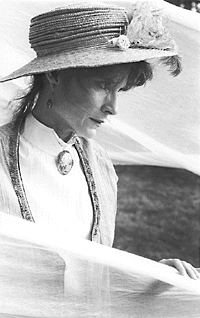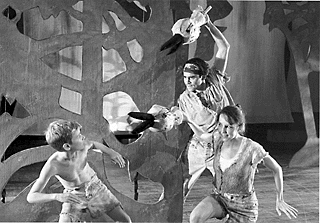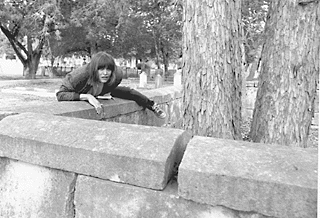Exhibitionism
The Cherry Orchard: About Real People
Fri., Oct. 10, 1997
through October 19
Running time: 2 hrs, 30 min
 Chekhov can be a tricky beast to master. His plays are full of deep symbolism wisely disguised by a veneer of wit that illustrates the tortuous path the lives of his contemporaries took. Most directors manage to get a firm hand on the more ponderous points of Chekhov's plays, milking them for all their pathos while trying to guarantee a Tony for the diva. But rare is the director who can delicately manipulate the thin layer of humor that is crucial to any successful staging of Chekhov, and it is this levity that make his classics function well, if at all.
Chekhov can be a tricky beast to master. His plays are full of deep symbolism wisely disguised by a veneer of wit that illustrates the tortuous path the lives of his contemporaries took. Most directors manage to get a firm hand on the more ponderous points of Chekhov's plays, milking them for all their pathos while trying to guarantee a Tony for the diva. But rare is the director who can delicately manipulate the thin layer of humor that is crucial to any successful staging of Chekhov, and it is this levity that make his classics function well, if at all.
Fortunately, this St. Edward's University staging of Chekhov's The Cherry Orchard at Mary Moody Northern Theatre is a wonderful blend of all of the playwright's layers. Director Michael Costello has ensured that this talented cast exploits all the facets of this script. Not only are the socio-political angles of a country undergoing an intellectual revolution explored, but more commonplace themes like love and ambition are given equal weight. Costello has ensured that this is a show about real people.
Of course, the director could not have achieved any of this without a talented cast. While Costello has stacked his casting deck with some experienced hands, there are some outstanding performances by the SEU students as well. Professionals Ev Lunning, Jr. and Patricia Pearcy give well-crafted and exuberant performances as the once-wealthy brother and sister now faced with foreclosure on the family estate. Relative newcomers Jenny Larson as Anya, Christopher Guidry as Trofimov, and Nitra Elisa Guiterrez as Charlotta Ivanova shine. Special accolades, however, must go to Lee Merideth Eddy, who gives an endearing performance as Varya, capturing every ounce of the character's awkwardness and strength.
The show has almost as many technical strengths as performance strengths. Aziza Bey's turn-of-the-century costumes fit the tone of the play as well as the persona of the characters wearing them. Michael Massey's dynamic lights and amoeboid set make for fluid changes, although some of his choices doesn't quite seem to gel with the rest of the production. Unfortunately, Jim Watts' sound design just doesn't mesh with the rest of the show, and the last few cues are rather perplexing.
Taken as a whole, however, this show is something of which St. Edward's should be proud. From material that has tripped up many an artist because of its complex subtleties, overtones, and black humor, this cast and crew has created an entertaining evening of theatre. -- Adrienne Martini
Bambi: A Life in the Woods: Answering Questions
McCallum Fine Arts Academy Theatre,
through October 12
Running time: 1 hr, 15 min

Growing up is a mystery... at least while you're doing it. As a child and adolescent, the world is such a stranger, constantly bombarding you with the unknown. Everything about it raises questions. Who are the others that share this place with us? Where do we belong? What is danger? Why is there pain? For the young, unfortunately, few answers come easily, so most such questions hang in the air, challenging the young while they endure the mystery of growing up.
In his novel Bambi, Felix Salten transports that mystery into the forest where it is wrestled with by the animals living there. His central figure is a young deer who must seek the answers to life's puzzles in a world of hungry winters, human hunters, and a powerful but deeply enigmatic father. In James DeVita's dramatic adaptation, we see Bambi at three distinct stages: as a child, as an adolescent, and on the threshhold of adulthood. At each point, he confronts the hardness of the world and knows pain, and each time it brings him closer to the answers he seeks. Unlocking the riddles of the world is rarely easy, the play suggests, but one can do it, with patience and vigilance and persistence.
This is a rather hard-edged, complex lesson, and Austin Theatre for Youth admirably lays it out without any cubes of sugar to sweeten its taste. The approach by directors Rod Caspers and Kris Andrews is simple and honest, having the actors represent animals through understated, often delicate movement (beautifully choreographed by Andrea Ariel) and puppets -- cloth animal heads on dowels manipulated by the actors. The actors do a lovely job of evoking the essence of these creatures and, moreover, do a lovely job of establishing a sense of ensemble; they all seem to belong to the same world, and watching them step slowly through Shannon January's white shafts of light falling across Gary Van der Wege's towering abstract trees is a special pleasure.
It would be unfair to cast the production as all stones and gunfire -- it brims with childhood joys and familial affection and humor, rendered with spirit by the cast -- but the direction it takes and the place it ultimately leads us lie through a shadowy part of the wood, and it is a significant achievement of this production that it renders this with theatrical grace. Three actors take turns playing Bambi, each at a different stage of his life, but in moments of transition and moments of stress, two or more of the actors may share the stage, speaking the same lines in unison. It is a simple yet rich visual comment on the way we keep our younger selves inside us even as we grow. It may puzzle some of the younger members of the audience, but that is in keeping with the spirit of the script. There is mystery in the world, it tells us, but you can solve it in time. Keep your eyes open. Look. See for yourself.
Well said. -- Robert Faires
Goin' to Georgia: A Winning Ramble
Zachary Scott Theatre Center,
through October 19
Running time: 1 hr, 10 min

At some point in our lives, we all come to some place that speaks to us. It might be a summer camp or the home of some relation, a city or a farm, but whatever it is, wherever it is, it whispers to us of the world, of all its wonders and sorrows in their infinite variety, and does so with words that strike us as particularly vivid and make some sense of the world in a way no other place can.
In this new solo show, Joy Cunningham escorts us to just such a place, a small town which spoke to her as a girl and, judging from the lyricism and insight she brings to her evocation of it, speaks to her still. It is a little place in Georgia -- her momma's country -- and every summer of her childhood, Cunningham and her family made a pilgrimage there. She describes one such visit, the one in her 10th year, during which she came face-to-face with the end of her childhood and so to a greater understanding of her place in the world.
Cunningham's road to that epiphany is far from straight. She winds and rambles, taking detours at nearly every opportunity, veering from one story to tell another that provides a little background here, a little context there, possibly branching off from the story within the story to get to still another story, and so on. But, as with leisurely drives in temperate seasons, when you coast along with the windows rolled down, Cunningham's detours are thoroughly pleasant diversions. Cunningham takes such pleasure in being our guide and invariably has some delightful sight to share that, after the fact, her side trips seem like perfectly natural extensions of her journey.
The show is at its most winning, in fact, when its creator is taking pleasure in the telling of her story. In the early going -- at the performance I attended, at least -- Cunningham occasionally comes across as formal, even stiff, almost like a parent made a little tense by all the preparations for the family vacation. But once she hits the road, Cunningham begins to relax, to settle into her story and summon up the sights and smells of the South with relish. By the time she is nearing the end of the road, she conjures the sensation of eating fresh watermelon with such rapture that we can catch the sweet scent of it in the air and feel its sticky juices streaming down our arms. This place becomes very real to us, too, and as Cunningham calls forth a final image -- of darkness on a summer night, the warmth like a blanket and the night thick with stars and the music of crickets -- we can hear it whisper of the world, and its words make some sense of the world in a way no other place can.-- Robert Faires








